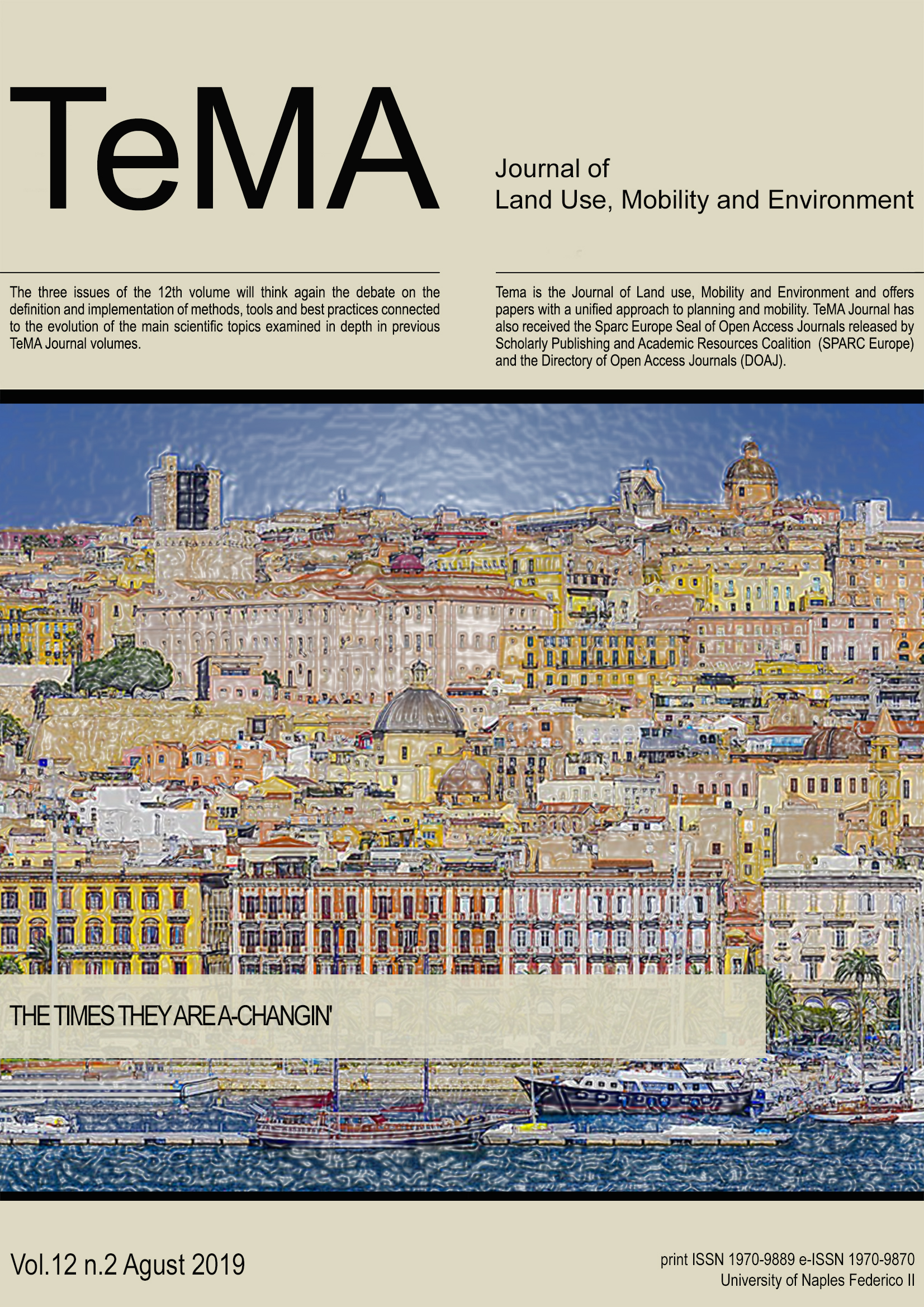Sport and the city, between urban regeneration and sustainable development
The Cagliari case study
DOI:
https://doi.org/10.6092/1970-9870/6119Keywords:
Sport in the city, Sustainable Development, Sport GovernanceAbstract
Sport has always played a prominent role in civil society. Although it has been conceived as a strategic political means throughout history, nowadays sport is considered a positive force in achieving sustainable development. The international documents recognize the contributions it makes to health, education and social inclusion objectives.
Anyway, the analysis concerning the relationship between sport and the city should consider both social and physical aspects because people are progressively understanding the city as an ideal palimpsest for sports activities. In this regard, the new phenomenon called "street sport" represents a real challenge for urban governance and planning.
The present study focuses on policies and urban design projects adopted by Cagliari City Council to make Cagliari a great Sports City. Cagliari has unique environmental, geographical and climatic features which allow to promote sport activities throughout the year. Moreover, in the recent years the City has realized significant interventions, both on a local and on a regional scale, as the operation - on going - of refurbishment and reconstruction of the new Stadium.
Within this favourable condition, the authors examine the community perception on benefits that sport provides for human well-being and for city development through the administration of a specific questionnaire. The outcome of this survey highlights to what extent citizens recognize Cagliari as a Sports City and gives interesting suggestions for the definition of shared policies and actions able to assume sport as a lever of sustainable development in the future.
Downloads
References
Balletto G. & Borruso G. (2018a). Sport and City. The case of Cagliari’s new stadium (Sardinia – Italy). In 22nd International Scientific Conference on Mind Scenery in the Landscape-cultural Mosaic. Palimpsests, Networks, Participation, Aversa/Caserta (Italy), July 2nd-3rd, 2018. In print.
Balletto G. & Borruso G. (2018b). Sport & the City: Forma ed effetti territoriali. In Atti XXII Conferenza Nazionale ASITA, Bolzano 27-29 novembre 2018 (pp. 67-74). ASITA. ISBN 978-88-941232-1-0
Clark, P., Niemi, M., & Niemelä, J. (eds.) (2009). Sport, Recreation and Green Space in the European City. Helsinki, FI: SKS Finnish Literature Society. ISBN 978-952-222-791-1 doi: http://dx.doi.org/10.21435/sfh.16
CNAPPC (2015). Il Piano Nazionale per la Rigenerazione Urbana Sostenibile. http://www.awn.it/attachments/article /731/CNAPPC_Piano_Nazionale_per_la_Rigenerazione_Urbana_Sostenibile.pdf
Comune di Cagliari. Cagliari Ambiente Sportivo. Dossier di Candidatura Città Europea dello Sport 2017. http://aceseurope.eu/wp-content/uploads/2017/08/cagliaribidfile.pdf
Comune di Cagliari. Cagliari Città Europea dello Sport 2017. Report di attività gennaio-settembre 2017. Comune di Cagliari. Dossier di candidatura di Cagliari a sede delle regate veliche.
Kiuppis, F. (2018). Inclusion in sport: Disability and participation. Sport in Society: Culture, Commerce, Media, Politics, 21(1), 4-21. doi: https://doi.org/10.1080/17430437.2016.1225882
Lindsey, I., & Darby, P. (2018). Sport and the Sustainable Development Goals: Where is the policy coherence? International Review for the Sociology of Sport, 1, 1-20. doi: https://doi.org/10.1177/1012690217752651
Smith, A., Ritchie, B. W., & Chien, P. M. (2019). Citizens’ attitudes towards mega-events: A new framework. Annals of Tourism Research, 74, 208-210. doi: https://doi.org/10.1016/j.annals.2018.07.006
Strazzeri, I. (2018). Introduzione alla Sociologia dello Sport. Milano, IT: Lampi di stampa. EAN: 9788848820417
Turner, D., & Carnicelli, S. (2017). Lifestyle Sports and Public Policy. London, UK: Routledge. ISBN: 978-1-138-65221-7
UNGA (United Nations General Assembly) (2015). Transforming our world: the 2030 Agenda for Sustainable Development. Resolution adopted by the General Assembly on 25 September 2015. A/RES/70/1.
Downloads
Published
How to Cite
Issue
Section
License
Authors who publish in this journal agree to the following:
1. Authors retain the rights to their work and give in to the journal the right of first publication of the work simultaneously licensed under a Creative Commons License - Attribution that allows others to share the work indicating the authorship and the initial publication in this journal.
2. Authors can adhere to other agreements of non-exclusive license for the distribution of the published version of the work (ex. To deposit it in an institutional repository or to publish it in a monography), provided to indicate that the document was first published in this journal.
3. Authors can distribute their work online (ex. In institutional repositories or in their website) prior to and during the submission process, as it can lead to productive exchanges and it can increase the quotations of the published work (See The Effect of Open Access)


